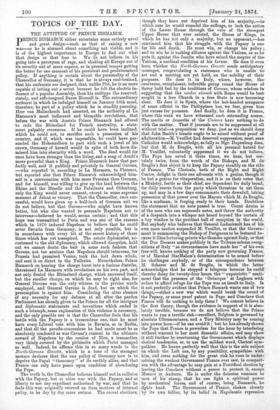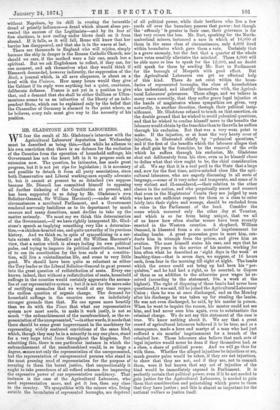TOPICS OF THE DAY.
THE ATTITUDE OF PRINCE BISMARCK.
PRINCE BISMARCK either entertains some entirely novel and great design—such as that of raising a new war—or he is alarmed about something not visible, and it is of the highest importance to Europe to find out what that design or that fear is. We do not believe in his going into a paroxysm of rage, and shaking all Europe out of its security out of mere caprice, or in personal temper getting the better for one moment of his persistent and predetermined policy. If anything is certain about the personality of the Chancellor of Germany, it is that he is always cool-brained, that his outbursts are designed, that, unlike Pitt, he is no more capable of letting out a secret because he felt the electric in- fluence of a popular Assembly, than his antitype the reserved, stately, and soft-tongued Baron Ricasoli is. The extraordinary outburst in which he indulged himself on January 16th must, therefore, be part of a policy which he is steadily pursuing. Herr von Malinckrodt had asserted, on the authority of La Marmora's most indiscreet and blamable revelations, that before the war with Austria Prince Bismarck had offered to cede the Rhineland for French neutrality, a state- ment palpably erroneous. If he could have been inclined, which he could not, to sacrifice such a possession of his country, and if, which was impossible, he could have per- suaded the Hohenzollern to part with such a jewel of his crown, Germany of herself would in spite of both have dis- missed him into obscurity with a word. The dead would for once have been stronger than the living, and a song of Arndt's more powerful than a King. Prince Bismarck knew that per- fectly well, said it publicly and privately to General Govone, —who reported it, according to La Marmora, to Florence, but reported also that Prince Bismarck acknowledged him- self in a conversation with him more Prussian than German, and for himself, was willing to give up the land between the Rhine and the Moselle and the Palatinate and Oldenburg, only the King would never consent, except in some supreme moment of defeat or victory. That the Chancellor, once suc- cessful, would have given up a half-inch of German soil we do not believe, but that Govone—who might have known better, but who also wanted to persuade Napoleon not to intervene—believed he would, seems certain ; and that this hope was transmitted to Paris, and was one of the reasons which in 1870 induced Napoleon to believe that he could sever Bavaria from Germany, is not only possible, but is in accordance with every bit of the secret history of those times which has yet transpired. The astute diplomatist, ac- customed to the old diplomacy, which allowed deception, held out we cannot doubt the bait in some such fashion that Govone, not too anxious that Napoleon should intervene, for Prussia had promised Venice, took the bait down whole, and sent it on direct to the Tuileries. Nevertheless, Prince Bismarck on hearing the charge burst into a furious diatribe, threatened La Marmora with revelations on his own part, and not only denied the Rhineland charge, which answered itself, but the smaller charge, on which he may be right also, for General Govone was the only witness to the precise words employed, and General Govone is dead, but on which the presumption is against him. Considering the utter absence of any necessity for any defence at all after the pardon Parliament has already given to the Prince for all the intrigues and diplomatic statements and inventions which ended in such a triumph, some explanation of this violence is necessary, and the only possible one is that the Chancellor feels that his battle with the Papacy is a tremendous one, that he must have every Liberal vote with him in Bavaria, as in Berlin, and that all the pseudo-concessions he had made must be as absolutely condoned as was Cavour's consent to the ultimate reward of Napoleon by the cession of Nice, a transaction very thinly covered by the plebiscite which Pietri managed so well. Indeed, he affirms this in so many words in the North-German Gazette, which in a tone of the strongest menace declares that the one policy of Germany now is to deprive the Papal "theocracy " of its earthly allies, and that France can only have peace upon condition of abandoning the Pope.
The truth is, the Chancellor believes himself not in collision with the Papacy, but at utter war with the Papacy, and at liberty to use any expedient authorised by war, and that he feels this war, originally entered on from motives of internal policy, to be day by day more serious. The recent elections, though they have not deprived him of his majority,—in which case he would remodel the suffrage, or lock the action of the Lower House through the veto of the strongest Upper House that ever existed, the House of Kings, in which he has not only a majority, but no opponent,—has convinced him that his struggle with the Papacy is one for life and death. He must win, or change his policy and to win he is making alliance against the Vatican, or as he puts it, agaiist the Jesuits who have seized the sceptre of the: Vatican, a cardinal condition of his favour. He does it even here, whither the North-German Gazette sends anticipatory messages, congratulating a statesman who is unable to• act and a meeting not yet held, on the nobility of their purposes. He does it in Italy, where, however, the- courteous, complaisant, inflexible group round the House of Savoy hold fast by the traditions of Cavour, whose wisdom in suggesting that the modus vivendi with Rome would be best sought in a free Church in a free State is now becoming clear. He does it in Spain, where the hot-headed arrogance of some official in the Philippines has, we fear, given him just excuse for pressure. And finally, he does it in France, where this week we have witnessed such astounding scenes. The merits or demerits of the Univers have nothing to do with the matter. That if journals are to be suppressed at all, without trial—a proposition we deny, just as we should deny that John Smith's treacle ought to be seized without proof of adulteration—M. Veuillot had deserved suppression, most sane Catholics would acknowledge, as fully as Mgr. Dupanloup does, but that U. de Broglie, with all his personal hatred for- M. Veuillot, voluntarily suppressed it we do not believe. The Pope has saved it three times, we hear, but cer- tainly twice, from the wrath of the Bishops, and M. de- Broglie's first object is to keep the Papacy steadily on the side of France. The Clericals, both of the Right and Right Centre, delight in their one advocate with a genius, though it be but a genius for vituperation, and it is on their votes that a Ministry, feeble as their chief, are dependent for daily bread, for daily rescue from the party which threatens to eat them up, and may in a few days consummate their downfall, taking possession of that power over the Mayors which M. de Broglie, like a madman, is forging ready to their hands. Doubtless the statement that no note passed is true. Count Arnim is of the men who can supersede notes, and throw the authority of a despatch into a whisper not heard beyond the curtain of a bay window in the prettiest hall of reception in the world. But anybody who believes that General Ladmirault has of his own mere motion suspended M. Veuillot, or that the Govern- ment is summoning the Bishop of Perigueax to be lectured be- cause it likes lecturing priests who thunder against Italy, or that the Duc Decazes makes publicly in the Tribune solemn recog- nitions of Italy " as circumstances have made her " of his oval free-will, knows nothing of the party now governing France, or of Marshal MacMahon's determination to be armed before• he challenges anybody, or of the correspondence between M. Scherer and M. de Broglie, in which the latter acknowledges that he stopped a telegram because he could thereby delay for twenty-four hours the " unpatriotic " senti- ment that the presence of the °renegue ' at Leghorn with orders to afford refuge for the Pope was an insult to Italy. Is it not perfectly evident that Prince Bismark wants one of two things,—either a new war which would break the sword of the Papacy, or some proof patent to Pope and Conclave that France will do nothing to help them ? We cannot believe in the first theory, though the evidence in support of it is abso- lutely terrible, because we do not believe that the Prince wants to run a terrific risk—recollect, Belgium is governed by absolute Ultramontanes, and a Tory Ministry may be coming into power here—if he can avoid it ; but he has alreadyshown the Pope that France is powerless for the hour by interfering without warrant in her most domestic affairs, and may show it still further by overturning the Government which displays clerical tendencies, or, to use the mildest word, Clerical sym- pathies. He knows perfectly well that this is the sole subject on which the Left can, by any possibility, sympathise with him, and cares nothing for the great risk he runs in under- mining the weakest Government France ever saw, in compari- son with the advantage he may gain at a Pontifical election by leaving the Conclave without a power to protect it, except Monaco or Andorre. He is under the delusion common to men of his stamp, that he can fight a spiritual power by mechanical forces, and of course, being Bismarck, he fights hard. The Government of France, shaken already by its own follies, by its belief in Napoleonic repression
without Napoleon, by its skill in rousing the incurable dread of priestly influence—a dread which almost alone pre- vented the success of the Legitimists—and by its fear of free elections, is now reeling under blows dealt on it from abroad. If it falls, as it will fall, Rome will know that her barrier has disappeared, and that she is in the waves at last.
There are thousands in England who will rejoice, simply because the ship in danger is the Roman Catholic Church, nor should we care, if the method were a fair one, much less a spiritual. But we ask Englishmen to reflect, if they can, for one moment, and ask themselves what they would think if Bismarck demanded, however indirectly, the suppression of the Rock, a journal which, in all save eloquence, is about on a level with the Univers. How many hours would they give the Cabinet if its reply were anything but a quiet, courteous, deliberate defiance. France is not yet in a position to give that, and a demand that she shall be either Gallican or Ultra- montane seems to us an infraction of the liberty of an inde- pendent State, which can be explained only by the belief that the Chancellor of Germany is alarmed to the point where, as he believes, every rule must give way to the necessity of his position.



































 Previous page
Previous page